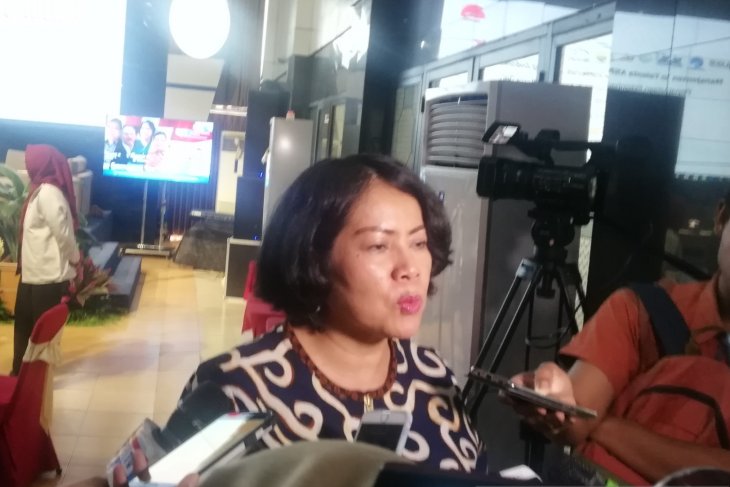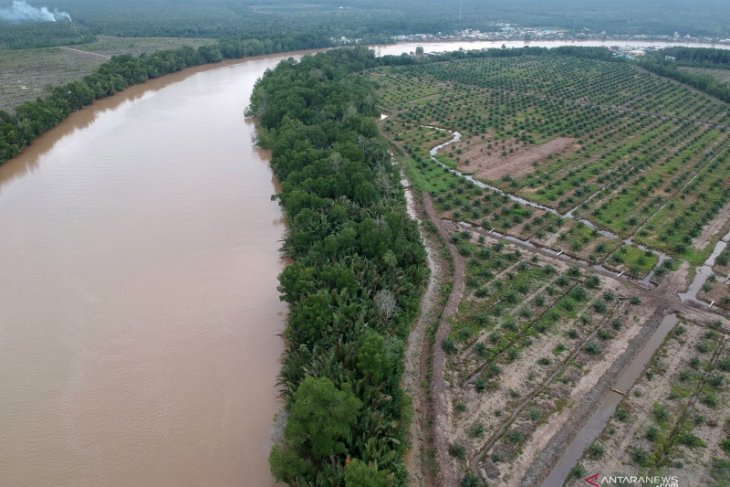Live Streaming
Program Highlight
Company Profile

Ani Hasanah
August

Secretary General of the Ministry of Communication and Informatics (Kemenkominfo) Rosarita Niken Widiastuti (ANTARA)
Secretary General of the Communication and Informatics Ministry (Kemenkominfo) Rosarita Niken Widiastuti invited the public to partake in celebrations to mark the 75th Anniversary of Indonesia, albeit by continuing to adhere to the health protocols.
"We invite all Indonesians to celebrate the 75th Anniversary of the Republic of Indonesia by continuing to comply with health protocols," Widiastuti stated during a virtual press conference from the Indonesian Presidential Office, Jakarta, on Thursday.
The secretary general also invited the public to put up the official 75th Anniversary logo of Indonesia on their respective social media handles and always harbor an optimistic outlook in the midst of a pandemic.
Widiastuti noted that during the 75th Independence Day of Indonesia, the Kemenkominfo was tasked with supporting publications and notifying the public of various series of events to mark the 75th anniversary.
"What we publish starts from disseminating information to the entire community, so that the people can actually put up logos on various public and private platforms, such as on cellphones as a profile picture and on social media, from tomorrow onwards, Friday (July 7)," he affirmed.
Furthermore, Kemenkominfo has disseminated information on the procedures for the ceremony on August 17 and the ways to show respect through new-fangled means via various platforms.
Information is being disseminated through television, radio, and online media platforms as well as by mobilizing all potential media owned by ministries and agencies, both central and regional, through websites or videotron. (ANTARA)
August

President Jokowi chaired a limited meeting on the merger of state-owned companies in the aviation and tourism sectors at the Merdeka Palace in Jakarta on Thursday, 06 August, 2020 (setneg.go.id)
Eight international airports in Indonesia can potentially become a hub and super hub for revolutionizing the country's tourism and aviation industries, according to President Joko Widodo (Jokowi).
"I record eight international airports -- Ngurah Rai Airport (Bali), Soekarno-Hatta (Banten), Kualanamu (North Sumatra), Jogjakarta, Balikpapan (East Kalimantan), Hassanudin (South Sulawesi), Sam Ratulangi (North Sulawesi), and Juanda (East Java) -- that have the potential to become the hub and super hub," President Jokowi stated during a limited meeting on the merger of state-owned companies in the aviation and tourism sectors at the Merdeka Palace in Jakarta on Thursday.
The government is gauging the possibility of merging state firms in the aviation and tourism for ushering in improvements in the two sectors.
Jokowi urged his aides to conduct an evaluation of the airports that hold potential to become hub and super hub airports in accordance with the geographical position and regional characteristics.
"We have to determine which airport can become an international hub," he noted.
The president affirmed that the number of international airports in Indonesia were far more than those in other countries. Currently, the country has 30 international airports.
"Do we need that many? Other countries I think did not do this. We can see that nine percent of the traffic was centered at only four airports in Soekarno Hatta, Ngurah Rai, Juanda, and Kualanamu," Jokowi noted.
Tourism and aviation are the two sectors that have borne the maximum brunt of the economic contraction in the second quarter of 2020.
Only 482 thousand tourists had visited Indonesia during the period, or an 81-percent drop from that recorded during the corresponding period in 2019 and 87 percent year-on-year.
"The contraction was very deep. However, I think the decline can be used as a momentum for consolidation and transformation in the tourism and aviation sectors by streamlining the management of flight routes, determining hub and super hub airports, and evaluating the possibility of merging state firms in tourism and aviation industries," Jokowi stated. (ANTARA)
Integrated management support will help bring about a leap in Indonesia's tourism sector, according to President Joko Widodo (Jokowi).
"Thus, the country will take a leap in the tourism sector as well as in the management of the tourism ecosystem and its supporters," President Jokowi stated at a limited meeting at the Merdeka Palace, in Jakarta on Thursday.
The head of state highlighted the significance of support from the world of aviation that had to be streamlined through more integrated management.
Jokowi called for greater consolidation of flights, from upstream to downstream.
"This has never been done, starting from airline to airport and flight service management," the president noted.
The president is looking for it to be connected to destination management as well as with hotel and travel management.
"This should also extend to the management of local products and creative industries that we have," he stated.
The Central Statistics Agency (BPS) announced that Indonesia's economy contracted by 5.32 percent in the second quarter.
"I saw that the tourism and aviation sectors were impacted and had deeply contracted," the president stated.
The Ministry of Tourism and Creative Economy had earlier readied strategies to cope with a projected decline in foreign tourist arrivals on account of the COVID-19 pandemic.
In a statement released here on Tuesday, spokesperson for the ministry's Task Force for COVID-19 Handling, Ari Juliano Gema, remarked that the ministry had estimated a significant fall in foreign tourist visits to Indonesia owing to the pandemic.
"We have prepared strategies as a precautionary measure to handle the decline in foreign tourist visits by applying new normal protocols in the sector," he noted.
The protocols will be applied in regions ready to receive tourists.
"President Joko Widodo has instructed us not to act hastily. During the recovery period, we will first focus on efforts to mobilize domestic tourists," Gema revealed.
The spokesperson pointed out that implementation of the protocols will depend on regional preparedness. The ministry is working on coordinating with regions that are ready to apply the protocols. (ANTARA)
August

Aerial photo of the condition of mangrove forest in the mangrove forest buffer area of East Sumatra, part of which has been converted into a palm oil plantation in Mendahara, Tanjungjabung Timur, Jambi, Friday (10/7/2020). Antara Foto / Wahdi Septiawan / wsj.
The Indonesian Institute of Sciences (LIPI), through the Research Center for Oceanography (P2O), along with COREMAP-CTI developed the MACADA application to monitor mangrove ecosystems.
"We are endeavoring to develop aspects that can help us all in properly monitoring or assessing mangrove ecosystems," LIPI's Head of Research Center for Oceanography, Augy Syahailatua, stated in Jakarta on Thursday during a virtual seminar on developing mangrove monitoring devices in Indonesia.
The Mangrove Collection and Analysis of Data (MACADA) application is designed for use by all and not solely for scientists to monitor and assess the condition of mangrove ecosystems.
The LIPI data collection on the structure of mangrove communities in various habitats is the basic material utilized to develop mangrove monitoring tools, such as the MACADA application.
Researcher at the Research Center for Oceanography I Wayan Eka Dharmawan stated that the Android-based application can be used to enter data and perform analysis while monitoring.
"The MACADA application is one of the three monitoring tools developed from the COREMAP dataset," Dharmawan remarked.
The application provides community structure parameters, such as density, morphological size, frequency, dominance, and mangrove health index.
"The Android-based application is very useful. We can input data and then analyze it," Dharmawan noted.
One can glean through information on using the MACADA application in the mangrove monitoring manual prepared by LIPI.
Indonesia is listed as a country with the largest mangrove ecosystem in the world. LIPI has monitored the condition of mangroves at 40 locations in Indonesia.
However, Dharmawan pointed to a 30-percent reduction in the area of mangroves in Indonesia since the 1900s owing to human development and activities.
The researcher highlighted the importance of structured and periodic monitoring and management of mangroves for mapping and maintaining mangrove ecosystems in Indonesia.
Meanwhile, a researcher at the Research Center for Oceanography Yaya Ihya Ulumuddin remarked that assessing the health status of mangrove ecosystems is deemed crucial in chalking out management actions, including determining conservation and rehabilitation areas.
The mangrove health index (MHI) is assessed on the basis of three structural parameters: canopy density in percent, average tree trunk diameter in centimeters, and the number of stands or small mangrove trees of stem diameter less than five centimeters.
"This index can describe the health status of mangroves, both in terms of the vegetation and biodiversity in it. Hence, MHI is expected to help mangrove ecosystem managers in determining management actions," Ulumuddin explained. (ANTARA)


